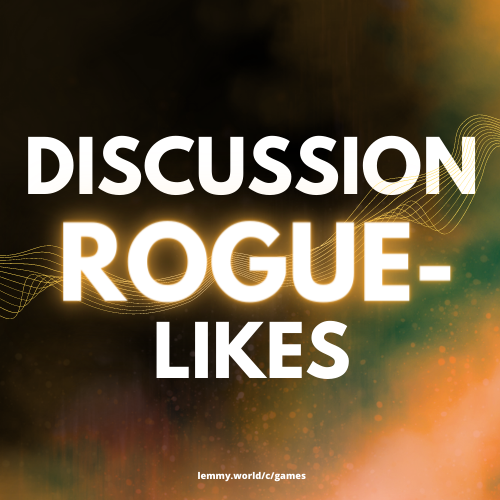Hello all, this is the first post in a series of posts I'll be making weekly to drum up some diverse discussion relating to all different aspects of gaming. I figured I would start with what I know, and so the first topic is thus: roguelike games. (If you think any of the below description is wrong or misleading, let me know - that's part of the discussion!)
The name of this genre is derived from the game Rogue, released in 1980. The exact definition of a roguelike has been a topic of discussion for a long time, but the core tenets are usually agreed upon to be random/procedural generation and permanent death (no saving and continuing a run, you have to start over). Many roguelikes have an additional increased focus on collecting items and assembling a "build" over the course of a run. A "pure" roguelike is often claimed to have no meta-progression (that is, no procedural unlocks) and focus more on the journey than the destination - seeing how far you can get, or how high a score you can achieve, rather than reaching a distinct victory condition (not that these games don't have victory conditions, but that it isn't the end-all-be-all). The secondary term "roguelite" is often brought out to describe games that deviate from this. Additionally, the term "traditional roguelike" is sometimes employed to indicate a more strict adherence to the older style of this genre, with grid-based dungeon crawling and high complexity. Ultimately, as with a lot of genres, pinning down a 100% ironclad definition is near impossible, but most people that like this type of game could tell you the general "vibe" at a glance.
Here are some questions and subtopics that I encourage people to discuss:
- What are some of your favorite examples of roguelike games?
- What roguelike games do you think stand out in terms of defying the conventions of the genre?
- Do you find there to be a meaningful difference between the usage of "roguelike" and "roguelite" nowadays? Which do you prefer? Where does the "traditional roguelike" fit into this?
- Do you continue to play roguelike games after reaching the "end" / reaching 100% completion? Why, or why not?
- What other genre do you most often enjoy seeing paired with roguelike?
- Is any game with procedural generation and a run-based structure a roguelike, or is there more to it? Where do you personally draw the line?
- What have been some of your best runs across all roguelike games? What's been memorable?
- Are there any upcoming roguelike games you're excited for?
Also feel free to bring up anything you like related to the topic! If you have suggestions for future discussion topics, leave them in the suggestion thread.
Additional Resources
-
Roguebasin, a wiki dedicated to roguelikes (specifically traditional roguelikes)
-
~~List of all Weekly Discussion Topics~~ (this is the first one, be patient!)


My personal definition of 'roguelike' is a game that is turn based, with perma-death and procedural generation, and ideally is also grid-based. A 'traditional roguelike,' to me, is more a specific set of games (Angband, NetHack, etc.), rather than a genre, but if you did want to use 'traditional roguelike' as a genre, it'd have all of the above, plus be a fantasy dungeon-crawler RPG. I also do think roguelikes and rogue-lites are meaningfully distinct, or atleast should be, even if most people don't consider them to be. Rogue-lites can be very fun games, but when I want a roguelike, I want a roguelike, not a fast-paced bullet hell whatever. The best roguelikes I've played thus far are Cataclysm: Dark Days Ahead (CDDA), and Cogmind. Plus I've been thinking of picking up Jupiter Hell and Dead Cells when I can, though AFAIK Dead Cells is more of a rogue-lite than a roguelike.
Though I've played games of the roguelike/lite genre for a while, I actually had to do a bit more of a deep dive to make this post. People ascribe a lot of different meanings to roguelike, and I got entirely conflicting messages on why the term roguelite was created. I hope what I put down is accurate enough!
Yeah, opinions on roguelikes/-lites are definitely very divisive, a problem I think that mostly comes down to prescriptive vs descriptive linguistics. Given that, I think you've done a perfectly good job in the OP.